Mentor Handbook

Thanks for signing up!
We appreciate your willingness to volunteer your time to help prepare the next generation of scientists and citizens! PlantingScience brings together scientists, teachers, and students in a community fostering student research, scientific inquiry, and mentorship.
The purpose of this handbook is to help you plan when you like to volunteer as a mentor and anticipate how to communicate with students. Throughout the handbook we also provide links to other mentor resources that will help you know what to expect and to become a better online mentor.
We aim to make mentoring as convenient as possible for you to volunteer your expertise, and you can participate from anywhere with an internet connection.
Mentoring does, however, require a commitment - the student teams and their teachers rely on your timely help to make it through their investigations.
Read on to get started! Clicking section headers below will expand each section
Your Role as a Scientist Mentor
The purpose of the asynchronous blog/online conversation is to provide a forum for conversation between scientists and students. Through the conversation, students have opportunities to reflect on their changing understanding, use you as a sounding board for their ideas and thinking, get to know a scientist as a person and how scientists approach scientific investigations, and enrich their knowledge of plants in their everyday lives and in life on Earth.
You help students to:
- see the fun and interesting side of plant science
- see scientists as someone like them
- visualize everyday experiences with plants
- put forward and unpack their ideas about biology content
- be more reflective about their ideas and reasoning
- use data as evidence in making their emerging models more sophisticated
- recognize conflicts between their emerging ideas, their everyday experiences, and data
- reason about cause-and-effect relationships and build mental models
You can learn more about your role, how to communicate with your teams more effectively, and how to support students’ scientific communications in the Mentor Roadmap: Communicating Science resource.
Time Commitment and Expectations
Students get very motivated and excited hearing from their scientist mentors and can be very disappointed when they do not get regular feedback, especially when other teams in their class are getting regular posts. Infrequent feedback can negatively impact the students’ experience and give students a negative impression of scientists. So it is critical that you commit to posting to your student teams frequently.
We have two PlantingScience sessions each year:
- Fall (Sept - Nov)
- Spring (Feb - Apr)
You can choose to participate in those sessions that fit your schedule. We will send an e-mail reminder to update your availability in your profile prior to each online session.
- Make sure your profile is up-to-date and includes an image (or avatar).
- Select the Investigation Themes you are comfortable supporting.
- Accept or decline invitations to groups within 3 days. By the time teachers or liaisons are inviting mentors to groups, they are very close to starting projects, so it is critical that teachers and liaisons get mentors into groups - and then assigned to projects - as quickly as possible.
- Anticipate about 1 hour a week mentoring students for every two teams you work with. Projects typically only last 2-4 weeks - so your timely input is vital!
- Post at least 2-3 times per week to your teams, more if your team is very active.
- Respond to your students’ postings within 24-48 hours. If possible, plan your posts so that new posts are available for students every time their class meets. Teachers will share class meeting times.
- If you will be out of contact for more than a few days, notify your teams’ mentor liaisons so that they can step in and fill needed gaps to keep your team moving.
IMPORTANT: Internet Safety Practices
There are some important rules and policies that you will need to follow to keep everyone in our community safe:
- Do not provide your personal e-mail contact information to students.
- Screen websites before recommending them to students.
- The program does not sponsor or authorize any unsupervised contact between mentors and students.
- If students would like to videoconference with you, be sure their teacher will be present as well.
- Students are instructed not to share their e-mail contact information or last names with you. However, sometimes students will accidentally put their full name on final presentation files or in their introductions. If you notice posts containing this information, let your mentor liaison know so we can remove those posts from the website.
How PlantingScience Works: The Basics
In the PlantingScience community, students work together in small teams to plan and carry out investigations in their classroom. Each team gets online advice and support from a scientist mentor (that’s you)!
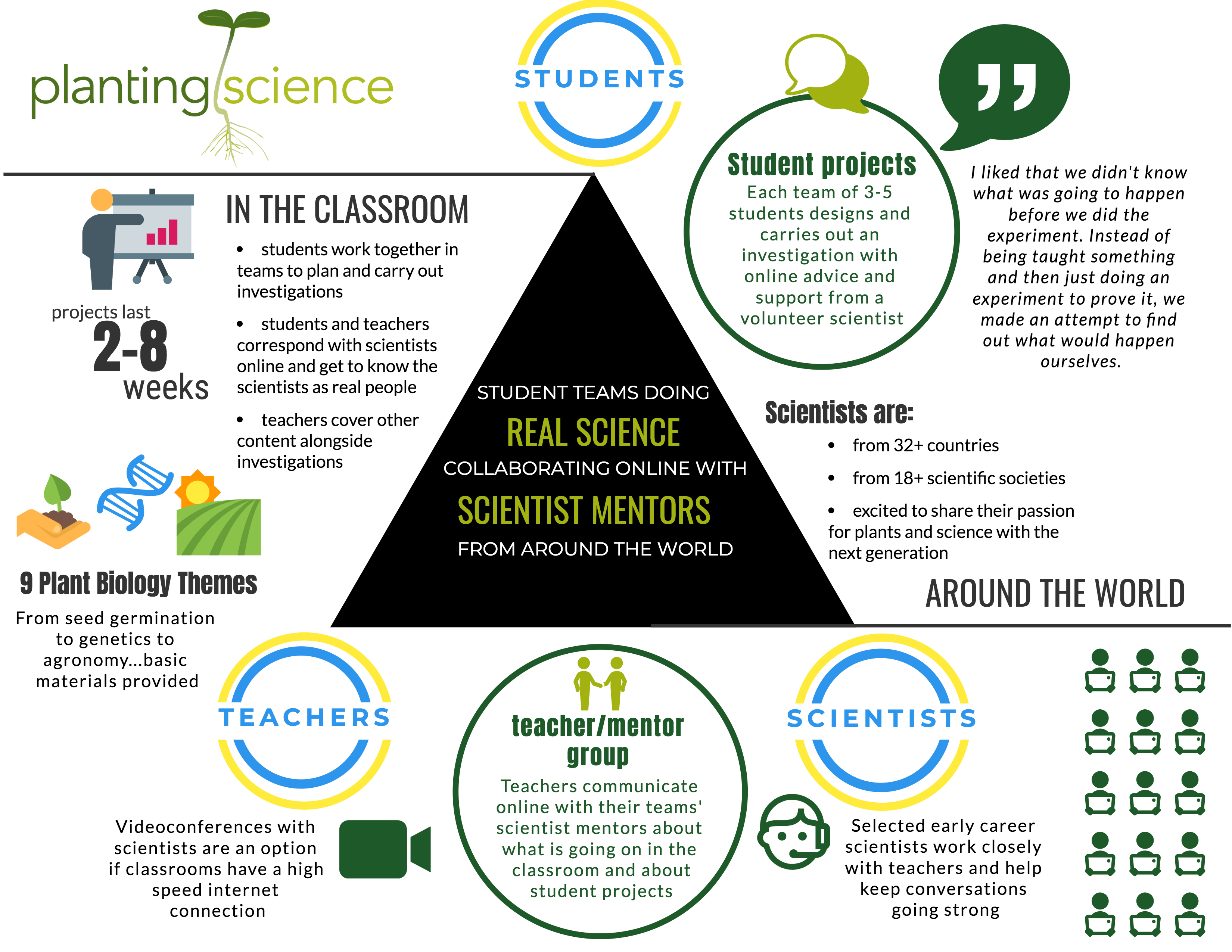
Teachers select mentors to work with their classes, and so your participation each session will start when you accept an invitation that comes to your e-mail inbox and shows up on your PlantingScience dashboard.
Once you’ve accepted an invitation, you will be added to the classroom group for that teacher, where you can communicate with the teacher, liaison, and other mentors who will be working with that teacher’s teams. This is where you can learn more about the class goals, background, and schedule as well as get updates from the teacher about what is going on in the classroom.
About a week or so before students come online, you will be added to a particular team’s project page, which is where you can introduce yourself and communicate with students.
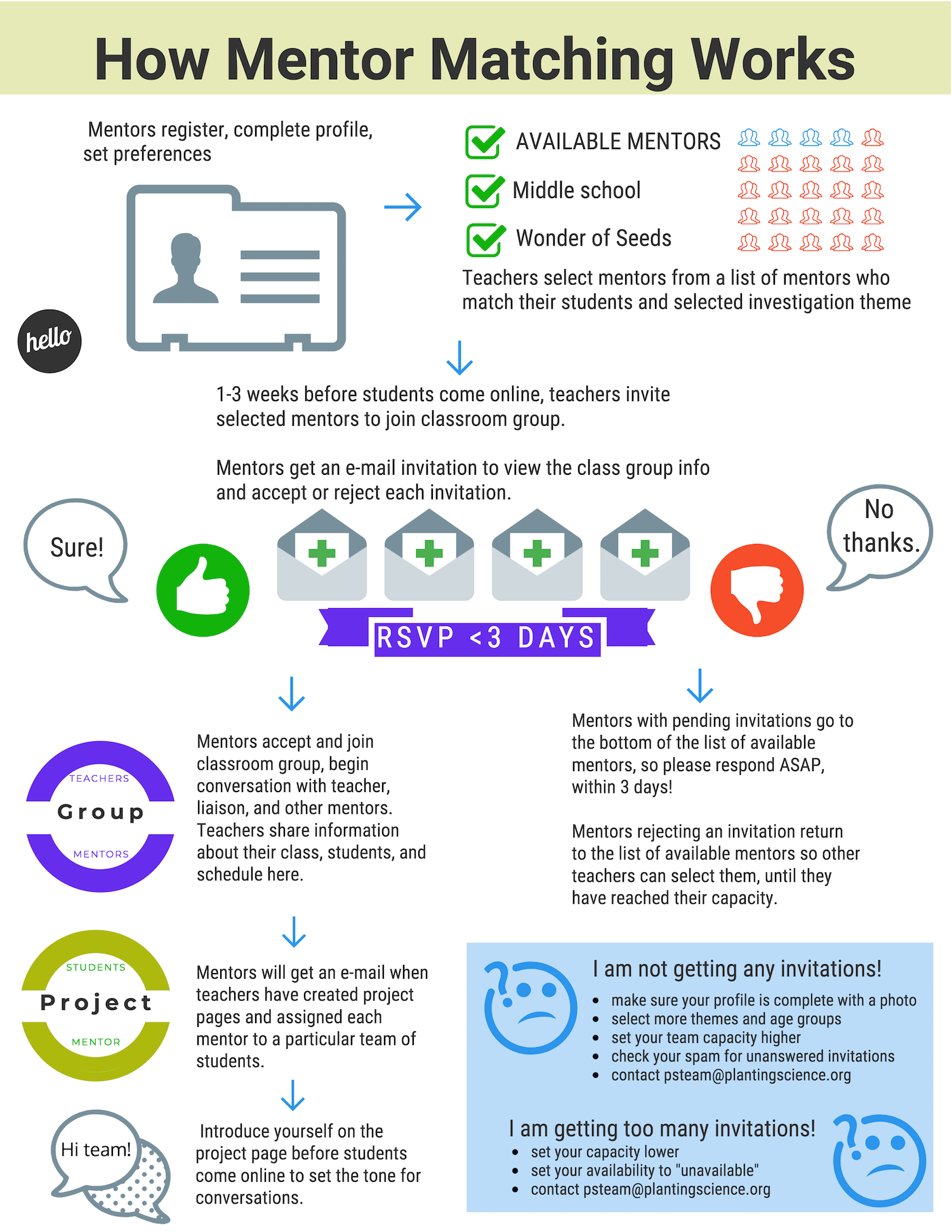
You can learn more about how to work with the website at our Mentor FAQ resource, which includes topics like:
- How do I set my profile to “Available”?
- How does mentor matching work?
- I haven’t been invited to mentor yet. What can I do to expedite this process?
- How do I see invitations and accept or decline them?
- What are “Investigation Themes”? Do I need to know anything about them?
- How do I know what projects I am mentoring?
- How do I post comments on my student teams’ project pages?
- My team hasn’t posted in a few days or more. What do I do?
- I’ve been asked to video conference with a class - what do I do?
Becoming a Better Online Mentor
Whether you are already an excellent mentor with extensive experience in face-to-face mentoring, or you are mentoring with us to grow your mentoring and science communication skills, it doesn’t hurt to learn a bit from our experienced mentors about how to have success in this asynchronous online environment.
We have lots of mentor resources to help you, developed by staff and by other mentors and liaisons who have participated in the community. Dig in!
Mentor Tips Video
The video below was developed by Digging Deeper Fellows as part of an NSF summer institute funded by NSF. Fellows share their top tips for PlantingScience mentoring success.
More Mentor Resources:
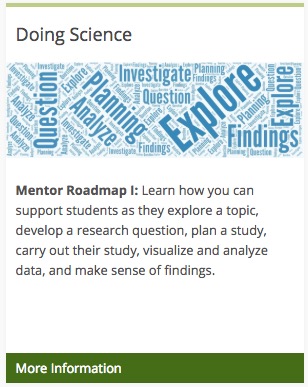 |
Mentor Roadmap - Doing SciencePlantingScience mentors guide students through all stages of the inquiry cycle. Learn how you can support students as they explore a topic, develop a research question, plan a study, carry out their study, visualize and analyze data, and make sense of findings. |
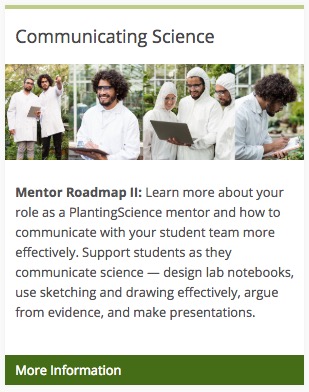 |
Mentor Roadmap - Communicating ScienceCommunication is an important component of science. First learn more about your role as a PlantingScience mentor and how to communicate with your student team more effectively. Then get specific tips for supporting students’ own scientific communication journeys as they learn to design lab notebooks, use sketching and drawing effectively, argue from evidence, and make presentations. |
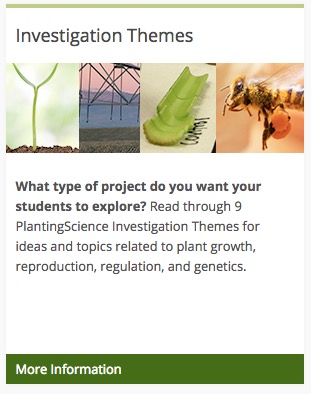 |
Investigation Themes: Mentor Tip GuidesMost investigation themes have a mentor tip guide explaining the top student misconceptions surrounding the topic, specific things you are likely to encounter, and a list of resource links that might be helpful for you as you help students through the theme. You are also welcome to check out the teacher guide and/or student guide for each theme, to better understand what is going on in the classroom. |
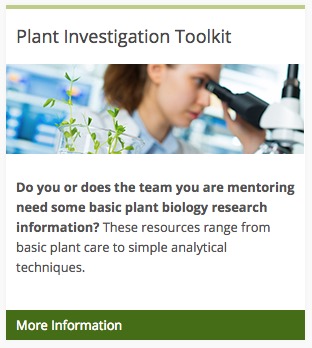 |
Plant Investigation ToolkitThe Toolkit includes resources for student investigations that go beyond the protocols outlined in the various investigation themes. Depending on the project your student teams come up with, this resource might be helpful additional information you can point them toward. Topics include using math, plant care, investigating safely, lab research, field research, imaging technology, and using microscopes. |
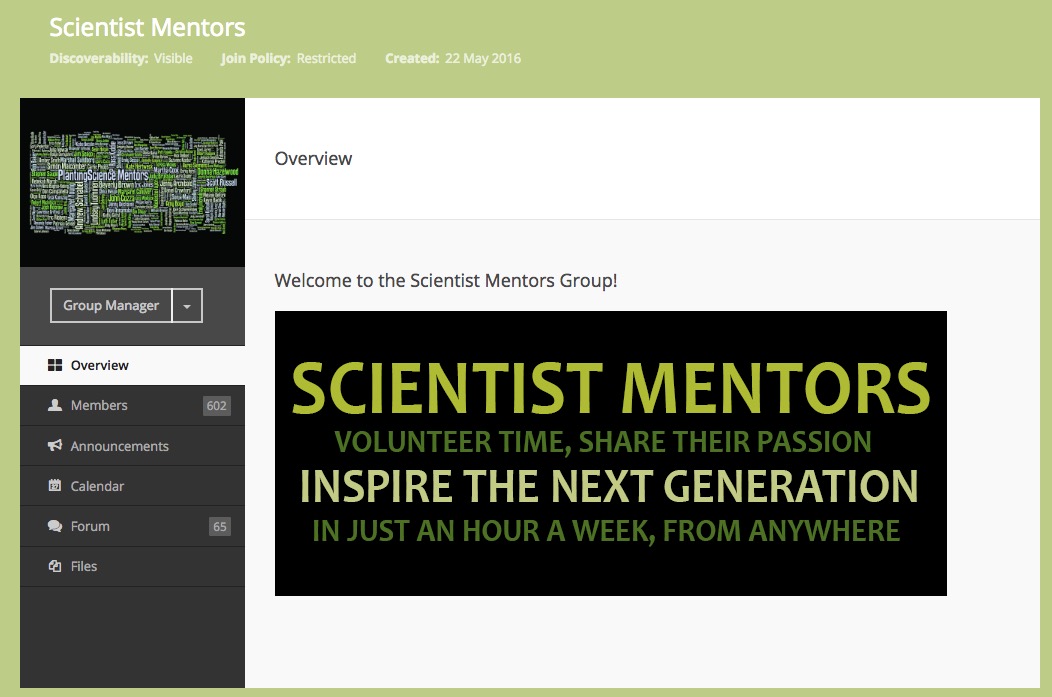 |
Mentor Group (logged in mentors only):On registration, you are automatically added to the Scientist Mentor Group, which includes a forum for communicating with and learning from our community of 600+ registered scientist mentors. Need advice on responding to your team? Ask in the mentor forum to get suggestions from other experienced mentors. Been mentoring awhile and have some tips of your own to share? This is the place to reach other mentors. |
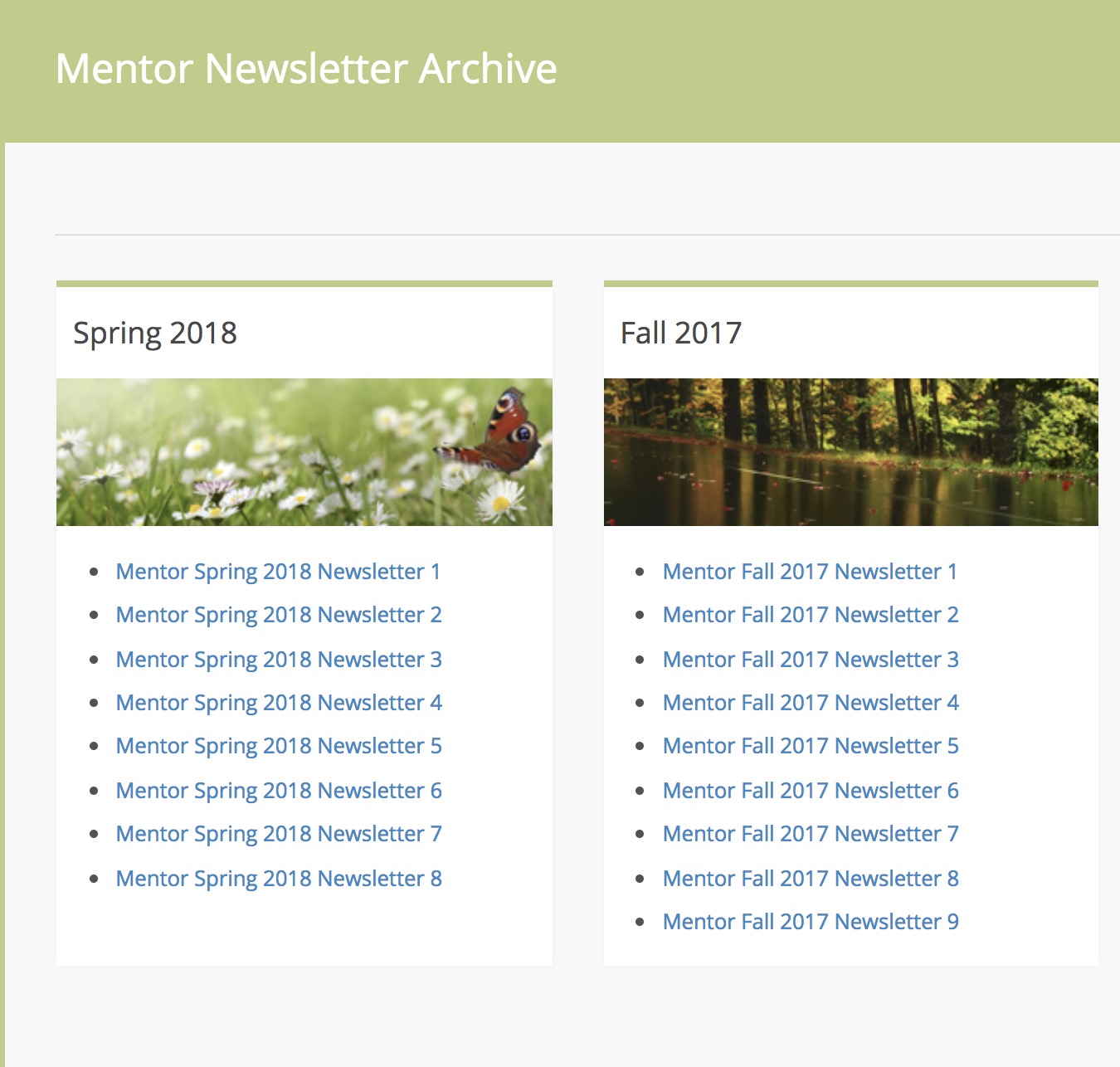 |
NewslettersEach week of a session, we send a PlantingScience newsletter via e-mail to mentors marked as “available” in our gallery. These newsletters include featured student or scientist posts from the week, announcements, and resources of interest to mentors. Archived mentor newsletters are available here. |
Troubleshooting and Additional Questions
We want your mentoring experience to be rewarding! Let us know how we can help.